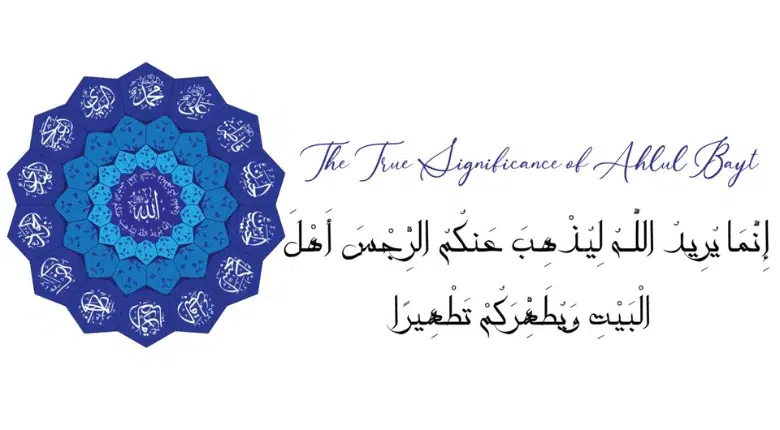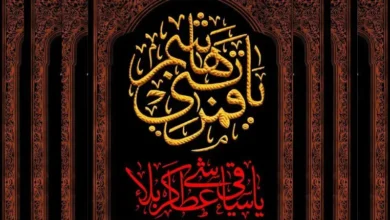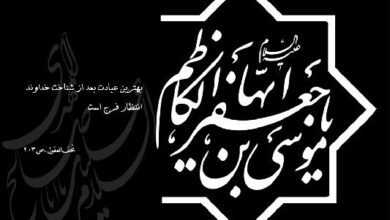The True Significance of Ahlul Bayt

Ahle Bait In this article ,you will know about the real Shia beliefs and actual personalities who are the part of Ahlul Bayt as per the majority of reliable sources found in both Sunni and Shi’a compilations, the Ahlul Bayt of the Prophet are regarded as one of the most esteemed emblems of Islam subsequent to the Prophet’s passing.
The Prophet (pbuh) has emphasized the importance of adhering to the two weighty things (al-Saqalain), namely the Quran and Ahlul Bayt, in order to avoid deviating from the correct path. These traditions are presented in the collections of both schools.
Significance of Ahlul Bayt in Shia Beliefs
According to the teachings of the Messenger of Allah, it has been conveyed that the aforementioned two weights are indivisible and will remain conjoined until the Day of Judgment. In order to comprehend the interpretation of the Qur’an and the Sunnah of the specifically Prophet (pbuh), it is necessary to consult those who are intimately connected to it, the Ahlul Bayt.
Acquiring precise knowledge in shia beliefs about the identity of Ahlul Bayt assumes significant importance in light of the aforementioned tradition of the Prophet (pbuh) and several other traditions that unambiguously affirm that following Ahle bait is the sole means of attaining salvation. This statement suggests that those who adhere to an incorrect interpretation of Ahle bait may be misguided.
The Ahlul Bayt of the Prophet (pbuh)
Given the significant significance of this topic, it would not be unexpected to observe that there are divergences between the Shia and certain Sunnis regarding this matter. It is worth noting that there is a lack of consensus among the Sunni community regarding the identification of the members of the House of the Prophet. According to the Sunni perspective, the Ahlul Bayt of the Prophet (pbuh) is comprised of Hazrat Fatimah al-Zahra (sa), who is the daughter of the Messenger of Allah, as well as Imam ‘Ali (as), Imam al-Hasan (as), Imam al-Hussainn (as) and the wives of the Prophet (pbuh).
Some Sunni scholars extend the list to encompass all of the Prophet’s descendants. Certain Sunni sects exhibit a magnanimous approach by encompassing the lineage of Abbas (the Abbasid) along with the lineage of Aqil and Ja’far (the two brothers of Imam Ali) within their roster. It is worth mentioning that certain Sunni scholars also have held the view that the wives of the Prophet do not fall under the category of Ahlul Bayt. This is in accordance with the perspective of the Shia.
According to the Shia belief system, the Ahlul Bayt of the Prophet (pbuh) is limited to the following individuals exclusively:
The individuals in question are
- Hazrat Fatimah al-Zahra (sa)
- Imam Ali (as)
- Imam al-Hasan (as)
- Imam al-Hussain (as),
And nine subsequent generations of descendants stemming from Imam Hussain (as) to the twelfth Imam Hazrat Imam Mehdi (ajtfs).Upon the inclusion of the Prophet (pbuh) himself, the total number of individuals will amount to fourteen which are called Chahaarda Masomeen (as). During the era of the Holy Prophet, it is noteworthy that only five individuals, including the Prophet Himself, were alive, while the remaining individuals had not yet come into the world.
According to Shia belief, the fourteen individuals are divinely protected by Allah and are therefore considered infallible. As such, they are deemed worthy of obedience alongside the Qur’an, which is also regarded as a weighty symbol. Furthermore, the Shi’a maintain that these individuals possess exclusive knowledge regarding the interpretation of Quranic verses.
The purpose of this discourse is to explicate the rationale behind the Shia’s exclusion of the Prophet’s wives from Ahlul Bayt. Additionally, we will provide a succinct analysis of the reasons why Ahle bait is safeguarded and considered infallible. Further elaboration on the concept of infallibility is expounded upon in Chapter 2. The foundations of our proofs are derived from three primary sources: the Quran, traditions sourced from authentic Sunni collections, and historical events.
The Quranic text contains a reference to Ahlul Bayt and their outstanding moral qualities in a specific verse commonly referred to as the “Purification Verse” (Ayat e Tathir).
إِنَّمَا يُرِيدُ اللَّـهُ لِيُذْهِبَ عَنكُمُ الرِّجْسَ أَهْلَ الْبَيْتِ وَيُطَهِّرَكُمْ تَطْهِيرًا
The statement suggests that Allah has the intention of preventing any form of impurity from affecting the People of the House (Ahlul Bayt) and purifying them with an impeccable purification. The final phrase of Verse 33:33 in the Quran.
As per Shia It should be noted that the term “Rijs” in the aforementioned verse is preceded by the definite article “al-“, thus rendering the term universal in nature. The term “al-Rijs” denotes a comprehensive range of impurities. Furthermore, in the concluding part of the verse, Allah declares the act of purifying oneself with a complete and flawless purification. The term “perfect” has its origins in the emphasis placed on “Tathira”. This is the sole instance in the Quran where Allah employs the emphasis of “flawless purification.”
As per the shia in Ayat e Tatheer , Allah articulates His desire to maintain the purity and impeccability of Ahlul Bayt The Quran attests to the fact that whatever Allah intends, shall undoubtedly come to pass (refer to 16:40).
It is plausible that a human has the potential to be free from sin as they possess the capacity to refrain from engaging in sinful behavior. The decision to adhere to Allah’s directives and seek His assistance in abstaining from transgression rests with the individual, while the alternative is to disregard Allah’s mandates and engage in sinful behavior. Allah assumes the roles of an advisor, an encourager, and a warner.
Undoubtedly, a human being who is devoid of sin remains within the confines of humanity. Certain individuals argue that possessing flaws is a necessary aspect of humanity. This assertion lacks substantiation. It is a widely acknowledged fact that humans are capable of making errors, although it is not necessarily a requirement.
The attraction of Allah towards His servants is attributed to His Grace, which operates without exerting any form of compulsion. It is within our discretion to pursue this attraction while exercising prudence and avoiding errors, or to opt out and succumb to errors.
According to Islamic belief specially as per Shia Allah has made a promise to guide individuals towards the correct path and offer them a life of purity, provided they actively seek it. This assurance is extended to both men and women who engage in righteous deeds and remain steadfast in their faith. As a result of their efforts, Allah has pledged to grant them a life that is free from impurities. The scriptural reference is Quran 16:97.
According to Shia Islamic teachings, those who fulfill their obligation to Allah will be granted a means of escape by Allah. The scriptural reference is Qur’an 65:2.
The verse 33:33 of the Quran, which pertains to the purification of Ahlul Bayt, is noteworthy for its placement amidst verses concerning the wives of the Prophet (pbuh). This has led some Sunnis to include the wives of the Prophet in the Ahlul Bayt.
Nevertheless, the aforementioned sentence pertaining to Ahlul Bayt stands out from the preceding and subsequent sentences with a distinct differentiation. The sentences preceding and succeeding utilize solely feminine gender, indicating that they are specifically directed towards the wives of the Prophet (pbuh). However, conversely, the aforementioned sentence exclusively employs masculine gender, thereby implying that the Quran is altering the individuals to whom it pertains.
Individuals rather than who possess a certain level of familiarity with the Quran are aware that the sudden shift in addressee is not an anomalous occurrence, as it has been employed in various instances throughout the text. As an example, a passage in the Quran states, “Oh Joseph!” Kindly transmit this message and implore pardon for your transgression, O spouse of Aziz, as you have indeed erred. The reference is Quran 12:29.
The verse does not include the address “O wife of Aziz,” and instead appears to maintain its focus on Joseph (peace be upon him). The shift in gendered address from masculine to feminine in the second sentence unambiguously indicates that the addressee is Aziz’s wife rather than Prophet Joseph (as). It should be noted that both sentences are contained within a single verse. It is noteworthy to observe the swift shift in reference from Aziz’s spouse to Joseph and subsequently back to the former in the verses preceding verse 29, as well as within the verse itself.
In the Arabic language, the feminine gender is utilized when addressing a group of women. In the event that there is only one male individual within the aforementioned group, the masculine gender is employed instead. The aforementioned verse from the Qur’an unambiguously indicates that Allah is addressing a collective entity distinct from the Prophet’s wives, employing masculine language, and comprising certain male individuals.
Based solely on the analysis of verse 33:33, it is not possible to draw a definitive conclusion regarding the potential inclusion or exclusion of the Prophet’s wives from the Ahlul Bayt. The assertion in question can be substantiated through the genuine traditions of the Sunnis, as documented in the Sihah Sittah.
These traditions relay the Prophet’s identification of Ahlul Bayt. Additionally, a comparison of the characteristics of Ahlul Bayt as outlined in the Quranic verse with the conduct of certain wives of the Prophet, as reported in the shia Sittah, can be used to refute opposing claims.
The verse suggests that Allah is altering His intended audience from solely the wives of the Prophet, to a group that may comprise of male individuals, and potentially exclude the wives of the Prophet. This interpretation is based solely on the information presented within the verse.




